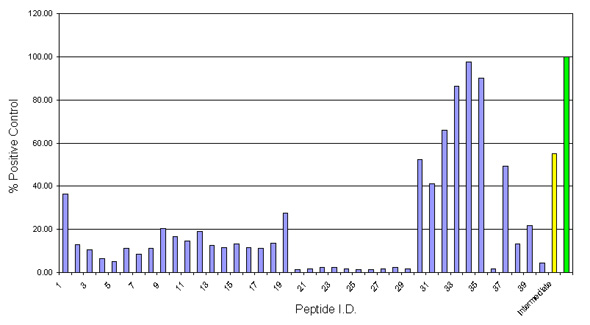Your basket is currently empty!
Mouse Class II Binding Assays
ProImmune REVEAL® Mouse MHC Class II
Service Description
In a breakthrough for studying T cell immune responses in the mouse, ProImmune’s REVEAL® MHC-peptide binding assays are available for the mouse MHC class II alleles H-2 IAb and IAd.
If you are working with a mouse model you can now obtain actual physical binding data to help you interpret results from functional cellular assays and discover new relevant T cell epitopes in your model.
These are the first commercially available mouse Class II MHC-peptide binding assays, and they complement ProImmune’s well-established HLA-peptide binding assays. MHC-peptide binding assays offer a significant acceleration of the epitope discovery process and are highly cost effective compared to working only with functional assays.
The MHC-peptide binding assays determine the exact binding sequence and MHC restriction of a potential T cell epitope in a single step and can be applied to any disease setting. The cell-free, in vitro assays are rapid and do not consume precious cell samples. The putative epitope can be validated using functional cellular assays, such as ELISpot and intracellular cytokine staining, and subsequently used to identify biomarkers and track responses in the pre-clinical stages of vaccine and immunotherapy development.
Typical projects have a turnaround time of 4-6 weeks. Narrowing down potential epitopes using the ProImmune REVEAL® assay at the outset of your project means that subsequent epitope validation assays can be done on a smaller scale, therefore requiring smaller cell sample sizes. This allows you to progress more rapidly and more economically. To perform the assay an overlapping peptide library is synthesized to cover the segments of interest of the candidate protein. These peptides plus a set of controls can be tested for binding to either the IAb and IAd alleles, or both.

Figure 1: Example data for the H-2-IAd MHC-peptide binding assay showing the binding of peptides relative to positive (green) and additional (intermediate) (yellow) controls.
Since its launch in 2006, the ProImmune REVEAL® & ProVE® Rapid Epitope Discovery System has expanded to include the widest range of human class I and class II alleles for any such MHC-peptide binding assay service. The two new mouse class II binding assays join a list of twenty alleles for class I assays and 56 DR, DQ and DP alleles for human class II assays. The success of the technology is underscored by publications and case studies from our customers, and projects with leading universities, pharmaceutical and biotech companies.
MHC alleles expressed by inbred mouse strains
| H-2 | |||||||
| Class I | Class II | ||||||
| Strain | Appearance | Haplotype | K | D | L | IA | IE |
| Balb/c | albino | d | Kd | Dd | Ld | IAd | IEd |
| C3H/He | agouti | k | Kk | Dk | – | IAk | IEk |
| C57Bl/6 | black | b | Kb | Db | – | IAb | – |
| CBA | agouti | k | Kk | Dk | – | IAk | IEk |
